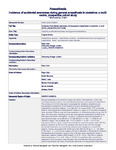Incidence of accidental awareness during general anaesthesia in obstetrics: a multi-centre, prospective cohort study
| dc.contributor.author | Odor, PM | |
| dc.contributor.author | Bampoe, S | |
| dc.contributor.author | Lucas, DN | |
| dc.contributor.author | Andrade, Jackie | |
| dc.contributor.author | Moonesinghe, SR | |
| dc.contributor.author | Pandit, JJ | |
| dc.date.accessioned | 2020-12-19T19:04:46Z | |
| dc.date.issued | 2021-01-12 | |
| dc.identifier.issn | 0003-2409 | |
| dc.identifier.issn | 1365-2044 | |
| dc.identifier.other | 0 | |
| dc.identifier.uri | http://hdl.handle.net/10026.1/16763 | |
| dc.description | No embargo required. | |
| dc.description.abstract |
<jats:title>Summary</jats:title><jats:p>General anaesthesia for obstetric surgery has distinct characteristics that may contribute towards a higher risk of accidental awareness during general anaesthesia. The primary aim of this study was to investigate the incidence, experience and psychological implications of unintended conscious awareness during general anaesthesia in obstetric patients. From May 2017 to August 2018, 3115 consenting patients receiving general anaesthesia for obstetric surgery in 72 hospitals in England were recruited to the study. Patients received three repetitions of standardised questioning over 30 days, with responses indicating memories during general anaesthesia that were verified using interviews and record interrogation. A total of 12 patients had certain/probable or possible awareness, an incidence of 1 in 256 (95%CI 149–500) for all obstetric surgery. The incidence was 1 in 212 (95%CI 122–417) for caesarean section surgery. Distressing experiences were reported by seven (58.3%) patients, paralysis by five (41.7%) and paralysis with pain by two (16.7%). Accidental awareness occurred during induction and emergence in nine (75%) of the patients who reported awareness. Factors associated with accidental awareness during general anaesthesia were: high BMI (25–30 kg.m<jats:sup>‐2</jats:sup>); low BMI (<18.5 kg.m<jats:sup>‐2</jats:sup>); out‐of‐hours surgery; and use of ketamine or thiopental for induction. Standardised psychological impact scores at 30 days were significantly higher in awareness patients (median (IQR [range]) 15 (2.7–52.0 [2–56]) than in patients without awareness 3 (1–9 [0–64]), p = 0.010. Four patients had a provisional diagnosis of post‐traumatic stress disorder. We conclude that direct postoperative questioning reveals high rates of accidental awareness during general anaesthesia for obstetric surgery, which has implications for anaesthetic practice, consent and follow‐up.</jats:p> | |
| dc.format.extent | 759-776 | |
| dc.format.medium | Print-Electronic | |
| dc.language | en | |
| dc.language.iso | en | |
| dc.publisher | Wiley | |
| dc.subject | accidental awareness during general anaesthesia | |
| dc.subject | anaesthesia | |
| dc.subject | general | |
| dc.subject | anaesthesia | |
| dc.subject | obstetric | |
| dc.subject | post-traumatic stress disorder | |
| dc.subject | recall | |
| dc.title | Incidence of accidental awareness during general anaesthesia in obstetrics: a multi-centre, prospective cohort study | |
| dc.type | journal-article | |
| dc.type | Journal Article | |
| dc.type | Multicenter Study | |
| plymouth.author-url | https://www.webofscience.com/api/gateway?GWVersion=2&SrcApp=PARTNER_APP&SrcAuth=LinksAMR&KeyUT=WOS:000606969100001&DestLinkType=FullRecord&DestApp=ALL_WOS&UsrCustomerID=11bb513d99f797142bcfeffcc58ea008 | |
| plymouth.issue | 6 | |
| plymouth.volume | 76 | |
| plymouth.publisher-url | https://associationofanaesthetists-publications.onlinelibrary.wiley.com/doi/10.1111/anae.15385 | |
| plymouth.publication-status | Published | |
| plymouth.journal | Anaesthesia | |
| dc.identifier.doi | 10.1111/anae.15385 | |
| plymouth.organisational-group | /Plymouth | |
| plymouth.organisational-group | /Plymouth/Admin Group - REF | |
| plymouth.organisational-group | /Plymouth/Admin Group - REF/REF Admin Group - FoH | |
| plymouth.organisational-group | /Plymouth/Faculty of Health | |
| plymouth.organisational-group | /Plymouth/Faculty of Health/School of Psychology | |
| plymouth.organisational-group | /Plymouth/REF 2021 Researchers by UoA | |
| plymouth.organisational-group | /Plymouth/REF 2021 Researchers by UoA/UoA04 Psychology, Psychiatry and Neuroscience | |
| plymouth.organisational-group | /Plymouth/REF 2021 Researchers by UoA/UoA04 Psychology, Psychiatry and Neuroscience/UoA04 REF peer reviewers | |
| plymouth.organisational-group | /Plymouth/Research Groups | |
| plymouth.organisational-group | /Plymouth/Research Groups/Centre for Brain, Cognition and Behaviour (CBCB) | |
| plymouth.organisational-group | /Plymouth/Research Groups/Centre for Brain, Cognition and Behaviour (CBCB)/Cognition | |
| plymouth.organisational-group | /Plymouth/Research Groups/Institute of Health and Community | |
| plymouth.organisational-group | /Plymouth/Research Groups/Plymouth Institute of Health and Care Research (PIHR) | |
| plymouth.organisational-group | /Plymouth/Users by role | |
| plymouth.organisational-group | /Plymouth/Users by role/Academics | |
| dc.publisher.place | England | |
| dcterms.dateAccepted | 2020-12-10 | |
| dc.rights.embargodate | 2021-1-19 | |
| dc.identifier.eissn | 1365-2044 | |
| dc.rights.embargoperiod | Not known | |
| rioxxterms.versionofrecord | 10.1111/anae.15385 | |
| rioxxterms.licenseref.uri | http://www.rioxx.net/licenses/all-rights-reserved | |
| rioxxterms.licenseref.startdate | 2021-01-12 | |
| rioxxterms.type | Journal Article/Review |


